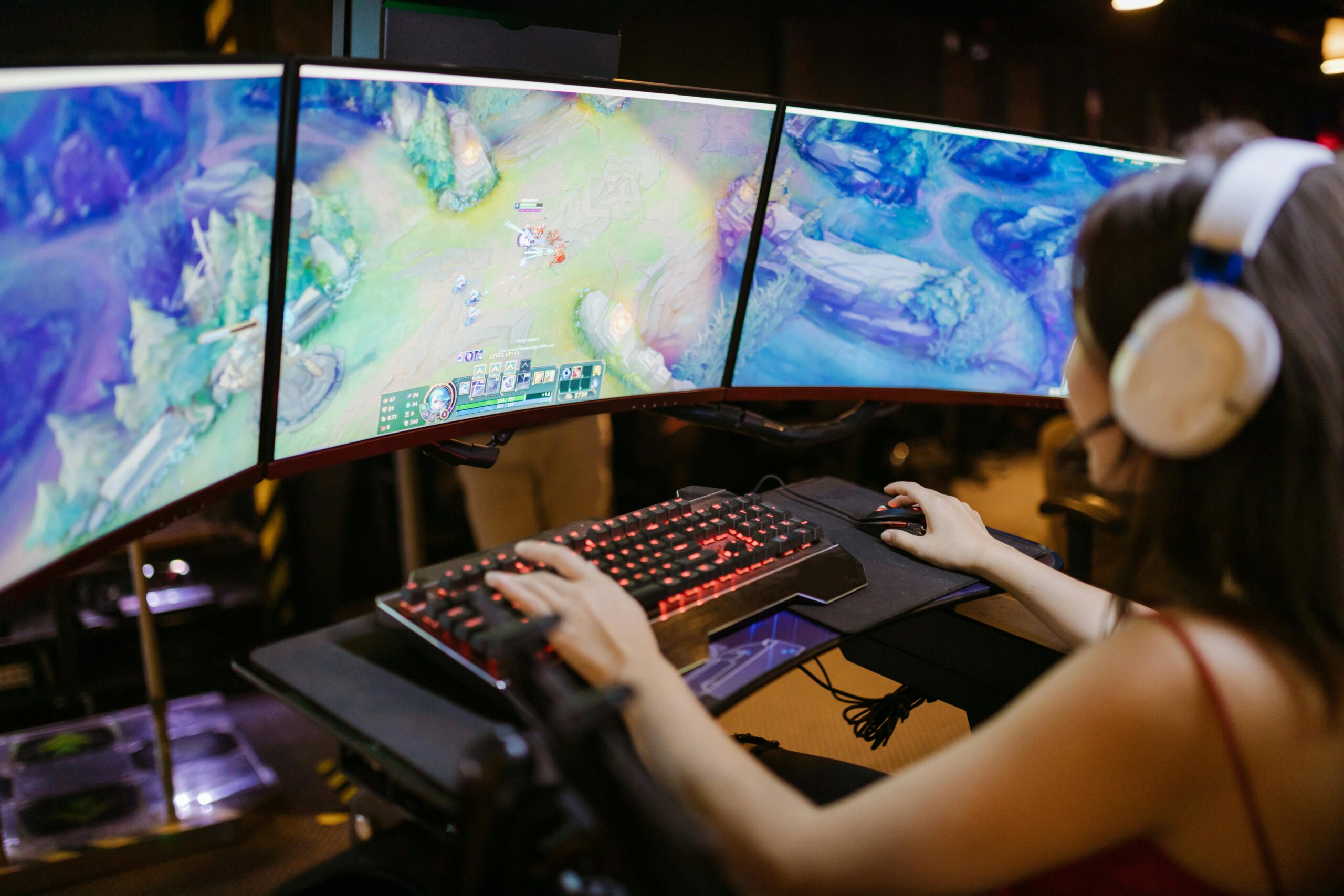The gaming industry has undergone tremendous evolution over the past few decades, with mobile games becoming a dominant force in the market. While mobile gaming has brought gaming to a broader audience and introduced new business models, it has also introduced challenges that have impacted traditional gaming platforms, especially PC gaming. In this blog post, we’ll explore the various ways in which mobile games are perceived as inferior to PC games and how they might be undermining the PC gaming market.
1. Performance and Graphics
Technical Limitations: Mobile devices, despite their advances in technology, are limited by their hardware constraints. Smartphones and tablets, while powerful for their size, cannot match the raw processing power of high-end gaming PCs. This limitation affects the graphical fidelity, frame rate, and overall performance of mobile games.
Example: AAA games on PC, like “Cyberpunk 2077” or “Red Dead Redemption 2,” offer highly detailed graphics and complex physics that are simply beyond the capabilities of mobile devices. The latest mobile games, while impressive for their platform, often have to make significant compromises in visual quality and performance.
Impact on PC Gaming Market: The disparity in performance between mobile and PC games highlights the superior capabilities of PC gaming. However, the growing popularity of mobile games with simpler graphics can lead to a devaluation of high-end PC games, as consumers may come to expect more affordable or even free games with lower production values.
2. Gameplay Depth and Complexity
Simplified Mechanics: Mobile games often feature simplified gameplay mechanics designed for short, casual play sessions. This approach caters to the on-the-go nature of mobile gaming but can lead to a lack of depth and complexity compared to PC games.
Example: Mobile puzzle games like “Candy Crush Saga” or “Angry Birds” are designed for quick, bite-sized gameplay. In contrast, PC games like “The Witcher 3” or “Civilization VI” offer rich, immersive experiences with complex mechanics and deep storylines that engage players over extended periods.
Impact on PC Gaming Market: The prevalence of mobile games with simplified mechanics might shift consumer expectations toward shorter, less complex gaming experiences. This shift could impact the demand for more intricate and time-consuming PC games, potentially diminishing their market appeal.
3. Monetization Models
Microtransactions and Ad-Based Revenue: Mobile games often rely heavily on microtransactions and ad-based revenue models. While these models can generate substantial profits, they also lead to a range of issues, including pay-to-win mechanics and frequent interruptions for ads.
Example: Many mobile games use a “freemium” model where the game is free to download but includes in-app purchases for virtual currency, power-ups, or cosmetic items. Games like “Clash of Clans” and “Fortnite” on mobile have faced criticism for aggressive monetization strategies that can lead to an imbalance in gameplay.
Impact on PC Gaming Market: The success of mobile games with aggressive monetization strategies can influence the broader gaming market. As developers and publishers seek to replicate the financial success of mobile games, we may see an increase in microtransactions and in-game purchases in PC games, potentially affecting the overall gaming experience.
4. Fragmented Ecosystem
Inconsistent Experiences: The mobile gaming ecosystem is fragmented due to the vast number of devices, operating systems, and screen sizes. This fragmentation can lead to inconsistent gaming experiences, with developers needing to optimize their games for a wide range of hardware.
Example: A game developed for iOS might not perform as well on Android devices due to differences in hardware and software. Additionally, varying screen sizes and resolutions can affect the user interface and overall experience.
Impact on PC Gaming Market: PC gaming benefits from a more standardized hardware and software environment, allowing for more consistent and high-quality experiences. The fragmentation in mobile gaming highlights the advantages of a more unified platform like PC, where developers can focus on creating optimized and immersive experiences without the complications of device variability.
5. Quality Control and Development Standards
Lower Bar for Entry: The barriers to entry for mobile game development are relatively low, allowing almost anyone with a basic understanding of programming and game design to create and publish a game. While this democratization has led to a surge in creativity, it has also resulted in a proliferation of low-quality games.
Example: The App Store and Google Play Store are flooded with low-quality mobile games, many of which are clones of successful titles or poorly designed. This saturation can make it difficult for players to find high-quality games amidst the noise.
Impact on PC Gaming Market: The influx of low-quality mobile games can lead to a devaluation of the gaming experience, as players may come to expect less polished and less engaging experiences. This shift can impact the perceived value of PC games, which often involve higher development costs and greater attention to detail.
6. Impact on Industry Trends
Shifting Focus: The success of mobile games has shifted industry focus toward monetization strategies and casual gameplay, which can influence the development priorities of larger studios and publishers.
Example: The success of mobile games like “Pokémon GO” and “Among Us” has led to an increased focus on games with social and location-based elements. This shift can impact the types of games developed for PC, potentially leading to a greater emphasis on casual and multiplayer experiences.
Impact on PC Gaming Market: The influence of mobile gaming trends can result in a homogenization of game types and mechanics across platforms. As PC developers and publishers adopt elements from successful mobile games, it may lead to a dilution of the diverse and complex experiences traditionally associated with PC gaming.
7. Gaming Community and Social Interaction
Casual Communities: Mobile games often foster more casual and less committed gaming communities. While mobile games can connect players, the interactions tend to be less immersive compared to the dedicated communities found in PC gaming.
Example: Mobile games like “Words with Friends” or “PUBG Mobile” offer social features, but the interactions are generally more superficial compared to the deeper engagement found in PC gaming communities associated with games like “World of Warcraft” or “Counter-Strike: Global Offensive.”
Impact on PC Gaming Market: The depth and dedication of PC gaming communities are often seen as a major strength of the platform. The more casual nature of mobile gaming communities may affect the perception of PC gaming’s social and interactive aspects, potentially diminishing the appeal of PC games that rely on robust community engagement.
8. User Experience and Interface
Touchscreen Limitations: Mobile games are designed for touchscreen interfaces, which can be less precise and less versatile than traditional input methods like keyboards and mice. This limitation affects gameplay, especially in genres that require precise controls.
Example: Real-time strategy games or first-person shooters typically offer a better experience with a mouse and keyboard setup, providing greater accuracy and control compared to touchscreen controls.
Impact on PC Gaming Market: The limitations of touchscreen interfaces highlight the advantages of traditional PC input methods. As mobile games continue to push the boundaries of what is possible with touch controls, the superior precision and flexibility of PC gaming inputs remain a significant advantage.
9. Longevity and Replayability
Shorter Lifespan: Many mobile games are designed for short-term engagement and often lack the depth and replayability of PC games. While some mobile games do offer extensive content, many are designed to be played in short bursts.
Example: Mobile games like “Temple Run” or “Flappy Bird” offer endless, repetitive gameplay but lack the depth and narrative richness found in PC games like “The Elder Scrolls V: Skyrim” or “The Legend of Heroes: Trails in the Sky.”
Impact on PC Gaming Market: The focus on short-term engagement in mobile games may influence player expectations, potentially affecting the demand for longer, more immersive PC games. However, the inherent depth and replayability of PC games continue to attract dedicated gamers seeking richer experiences.
10. Market Fragmentation and Developer Focus
Diverse Platforms: The mobile gaming market is fragmented across various platforms, including iOS, Android, and a multitude of device manufacturers. This fragmentation can dilute developer focus and lead to inconsistent quality and user experiences.
Example: A game optimized for high-end Android devices may perform poorly on lower-end devices, leading to a fractured user experience.
Impact on PC Gaming Market: PC gaming benefits from a more unified platform, allowing developers to concentrate their efforts on creating high-quality experiences for a specific set of hardware and software. The fragmentation of the mobile market underscores the advantages of the more standardized and controlled environment of PC gaming.
Conclusion
While mobile gaming has introduced new audiences to the world of video games and created innovative business models, it has also brought challenges that impact the traditional PC gaming market. From performance limitations and simplified gameplay to aggressive monetization strategies and fragmented ecosystems, mobile games often fall short compared to their PC counterparts. These factors can influence market trends and player expectations, potentially undermining the value of high-quality PC games.
However, it’s important to recognize that both mobile and PC gaming have their unique strengths and appeal. Mobile gaming excels in accessibility and convenience, while PC gaming offers superior performance, customization, and depth. By understanding the differences and challenges associated with each platform, developers and players can make informed choices and continue to enjoy the diverse and evolving world of gaming.








